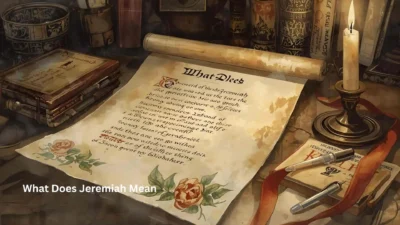Have you ever been scrolling through Instagram or chatting with someone when they suddenly text “je t’aime”—and you freeze for a second thinking…
What did they just say? Is this cute? Romantic? Or just French slang I should already know?
Don’t worry—you’re not the only one! Many people see foreign phrases online and instantly feel confused.
It looks fancy, it sounds romantic, and sometimes people use it casually. So what does it really mean?
Quick Answer:
“Je t’aime” means “I love you” in French.
It’s a romantic, affectionate, and emotional way of expressing deep love or strong feelings for someone.
🧠 What Does Je T’aime Mean in Text?
“Je t’aime” is a French phrase that translates directly to “I love you.”
You’ll usually see it used between couples, romantic partners, crushes, or anyone expressing love in a heartfelt way. While it can technically be used for friends or family in French, in texting—especially online—it’s mostly romantic.
Example:
“Goodnight… je t’aime ❤️”
In short: Je t’aime = I love you = a romantic and emotional expression of love.
📱 Where Is Je T’aime Commonly Used?
You’ll often see je t’aime in places where people like to be cute, creative, or romantic:
- 💬 Texting (especially couples)
- ❤️ WhatsApp / iMessage
- 📸 Instagram captions & comments
- 🎶 TikTok videos or reels with romantic music
- 💕 Snapchat streaks with partners
- 🌍 Multilingual or aesthetic posts
Tone:
- ✔ Romantic
- ✔ Emotional
- ✔ Soft/cute
- ✔ Aesthetic / trendy
- ❌ Not formal
- ❌ Not business-friendly
💬 Examples of Je T’aime in Conversation
Here are realistic chat-style examples (lowercase, emojis, casual tone):
1.
A: hey, did you get home safe?
B: yeahh, all good. je t’aime ❤️
2.
A: good morning 😘
B: morning bb… je t’aime lots
3.
A: i miss youuuu
B: je t’aime, come soon 😩💕
4.
A: u still mad?
B: no… je t’aime 😔♥️
5.
A: that picture of us is sooo cute
B: ikr 😭 je t’aime sm
6.
A: call me when you’re free
B: sure babe, je t’aime 💗
7.
A: long day today?
B: yeah but your msg made it better… je t’aime 🥺
🕓 When to Use and When NOT to Use Je T’aime
✅ When to Use “Je t’aime”
Use it when you want to express:
- ❤️ Romantic love
- 💑 Affection toward a partner
- 😍 Flirty emotions
- 💕 Deep emotional connection
- 🥺 Soft, sentimental moments
- 🌙 Goodnight/good morning messages
❌ When NOT to Use “Je t’aime”
Avoid it when:
- ❌ Talking to coworkers
- ❌ Messaging teachers, clients, or bosses
- ❌ Talking to strangers
- ❌ In professional or serious settings
- ❌ When you mean “I like you” (it’s stronger than that)
📊 Comparison Table
| Context | Example Phrase | Why It Works / Doesn’t Work |
| Friend Chat | “love yaa 🤍” | Casual & friendly; not too strong |
| Romantic Chat | “je t’aime so much ❤️” | Emotional & deeply affectionate |
| Work Chat | “Please review when free.” | Professional & clear |
| “Kindly review at your convenience.” | Formal & appropriate | |
| First-time convo | “je t’aime 😳” | Too strong; avoid it |
🔄 Similar Slang Words or Alternatives
| Slang / Phrase | Meaning | When to Use |
| ILY | I love you | Everyday texting, casual love |
| ILYSM | I love you so much | Strong affection for partner/friends |
| ILYBB | I love you baby | Cute/romantic chats |
| Ti amo | I love you (Italian) | Aesthetic or romantic chats |
| Te amo | I love you (Spanish) | Deep romantic tone |
| Love ya | Care about you | Friends or casual tone |
❓ FAQs About Je T’aime
1. Is “je t’aime” always romantic?
Mostly yes. On social media, it’s almost always used romantically, though French speakers may use it for close family as well.
2. Can I say “je t’aime” to my crush?
Absolutely—if you’re ready to express genuine feelings. It’s a strong phrase, so use it wisely.
3. What’s the difference between “je t’aime” and “je t’adore”?
- Je t’aime = I love you (deep/romantic)
- Je t’adore = I adore you (cute/less intense)
4. Is “je t’aime” flirty or serious?
Both. It can be flirty when used lightly, or deeply emotional in serious relationships.
5. How do you pronounce “je t’aime”?
It sounds like: zhuh tem
6. Can I use “je t’aime” in captions?
Yes! It’s trendy for romantic photos, couple pictures, or aesthetic quotes.
7. What’s stronger: “I love you” or “je t’aime”?
Both mean the same, but je t’aime feels more romantic and poetic because it’s in French.




